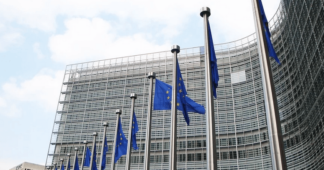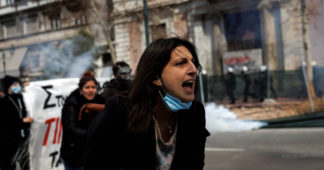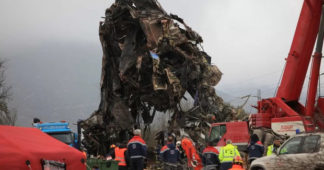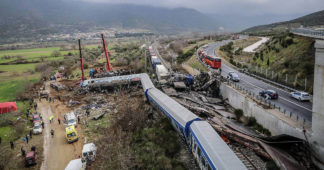The horrific head-on train collision in Greece last week, with a provisional death toll of 57, was a disaster waiting to happen.
By Eurydice Bersi (Reporters United)
Mar 10, 2023
Late in the evening on 28 February, nobody noticed a passenger train and freight train racing towards each other, on the same track near Tempi for an entire 12 minutes. The Larissa station master, who made the fatal mistake, is a 59-year-old former porter who received training last year. He had limited help from a partially functioning control system that only revealed the location of trains around Larissa, but went blind once they ventured a few kilometres out of the city.
As the country is consumed by grief and rage of unseen proportions, with protests taking place nationwide, there is a European dimension to the question: how could such a tragedy occur?
Staffing levels at the Greek railways are well below those required for the safe operation of the network. Also, the split between rail and passenger services, a precondition for privatisation, has led to a breakdown of security coordination. The first is a direct consequence of the policies imposed on the country by its EU creditors since 2010. The second stems from the EU Commission’s insistence on the separation of track and rail operations.
The companies running the railways and implementing safety upgrades are not Greek. The fully privatised passenger rail company belongs to Italy’s Ferrovie dello Stato group. The firm tasked with installing a new automated signalling system from Athens to the northern border, meant to be delivered by 2016 but still not in operation, is France’s Alstom. Experts are adamant that if this system was in place, the devastating crash wouldn’t have happened.
New research by Reporters United and Investigate Europe reveals that the consortium in charge of the signalling project – Alstom, and Aktor, a major Greek construction company – was, for years, violating the terms of the contract. Oversight by Ergose, the public company responsible for the network, has been suspiciously lax.
Both companies are multinationals with a controversial record on public contracts.
Aktor was nicknamed the “national contractor” due to its disproportionate share of state contracts won since the 1980s, allegedly thanks to its ownership of media and its cosy ties with successive governments.
Alstom, a French industrial giant, has endured numerous court battles in recent years. In 2014, most notably, the firm was ordered by the US government to pay a $772 million criminal fine, after pleading guilty to bribery charges at several of its global operations.
Both causes, the erosion of services due to cutbacks and the unaccountable nexus between large corporations and the political system, are structural. This explains the depth of the public rage. Most Greeks have themselves used the rail line connecting the country’s two biggest cities, Athens and Thessaloniki, so the shock hit close to home.
Delayed signalling upgrades
An internal 16-page report (available in Greek here), written in 2021 by a top official at Ergose and now published by Reporters United, details how Aktor and Alstom violated the terms of the largely EU-funded signalling contract. This resulted in a multi-year delay and a €2.4 million fine.
The memo directed to the Ergose management was written by engineer Christos Katsioulis, formerly vice-president of the committee overseeing the project. Until 2022, he was also head of the project to install the ETCS train control system. Katsioulis resigned in 2022 and has since become a thorn in the side of officials. His memo explains that Aktor was tasked with implementing the signalling updates, while Alstom was obliged to provide know-how. Instead, the pair split the line in two, with Alstom responsible for the northern part, and Aktor for a large section of the Athens-Thessaloniki line, where the collision happened.
“Ergose’s supervision insisted very much on the approval of studies that they knew were incorrect and did not pressure the contractor [Aktor] to fulfil their contractual obligations by having studies reviewed and signed by the expert know-how provider [Alstom],” writes Katsioulis.
The project was also delayed due to the companies demanding a supplementary contract for further works. This ended up being signed in 2021, five years after the planned completion, adding €13 million to the original €41 million contract. Katsioulis was scathing in his 2021 critique: First, Alstom refused to provide know-how. Then, in 2021, Aktor subcontracted all remaining works to Alstom, but the signalling system now being built will not be robust enough to cater for heavy train traffic. Neither Alstom nor Aktor replied to requests for comments.
A Troika legacy?
There are other ways in which the Greek rail tragedy is also a European one. Officials from the IMF, the EU Commission and the European Central Bank, the entity known as “the Troika”, who insisted upon an alarming number of job cuts in the sector, should also be held accountable.
It was reported that in 2010, Poul Thomsen of the IMF, the head of the Troika, was so outraged when shown the accounts of OSE, the state railway company, that he threw the folder to the ground and shouted “shut it down!”. “Restructuring” and “making operational activities profitable, including by closing loss-making lines” was part of the first bailout programme imposed on Greece as a precondition for loans in 2010. Parts of the network were shut down that year, while the rest suffered a slow death by constant job losses.
Greece’s railways employed 12,500 people in 2000, but numbers had plummeted to 2000 by 2021. This is estimated to be enough to safely operate only 300 km of the 2,500 km network. The staffing shortages were among the findings of an investigation conducted by Investigate Europe and Reporters United into Europe’s railways in 2021. But the more radical cost-cutting Greek governments implemented, the more they were rewarded by the troika.
Fatal privatisation
In 2017, while the leftist Syriza party was in power, the entire passenger train operation was sold to Ferrovie dello Stato, Italy’s state-owned railway provider, for a paltry €45 million, a privatisation that was a precondition for further Troika bailout loans.
Christos Retsinas, former head of security at Trainose (now renamed Hellenic Train and owned by Ferrovie dello Stato), last week revealed that the split between rail line and train operations led to the shut down of a unified safety control centre tasked with ensuring no mistakes were made at stations. Hellenic Train has not publicly disputed this claim. Retsinas also described how the new Italian management relieved train managers from their security-related tasks, in order to free more hands for passenger services.
Hellenic Train, the Ferrovie dello Stato subsidiary, claims it bears no responsibility for the accident. The company has successfully lobbied the Greek government to exempt it from the EU passenger rights regulation, meaning it is not obliged to compensate the wounded and the families of the dead. Under pressure, it has issued a statement reassuring that it will. Only after the crash did the company reveal that it had sued the rail company, OSE, for safety failures in the network. FSI did not respond to requests for comment by the time of publication.
This state of constant bickering between rolling stock companies and rail companies is one of the biggest weaknesses of the fragmented system. But Ferrovie and the Greek state appear to have found a balance of terror, to the detriment of safety. Ferrovie no longer requires modern safety systems in the new 15-year contract it has signed with the Greek state. The state no longer requires it to invest over €600 million during this period.
The Italian company is still on track to receive €750 million in state subsidies for the next 15 years. It is also obligated to invest only €62 million in rolling stock upgrades, most of which was spent on revamping 30-year-old Pendolino trains abolished in Switzerland.
Transport minister Kostas Karamanlis never faced any scrutiny for this 15-year deal. But his position became untenable in the aftermath of the crash and he had to resign. Only days before he had defended the safety of the train network in parliament: “It is shameful that you are raising safety issues and I urge you to recant immediately. It’s a disgrace. I explained and I will repeat: we ensure safety.”
Suddenly, the entire country is focusing on the repeated warnings of impending doom, issued during the past years by various rail worker unions. Greece has become a textbook case of how to bring a railway system to its knees. EU Commission chief Ursula von der Leyen sent a fact finding mission to Athens on Wednesday, and rightly so. The current and former Greek government responsibilities must be determined, and the role of Ferrovie dello Stato, Aktor and Alstom must become clear. Mrs von der Leyen might also want to shine light on the failures of the EU rail policies and the fatal decisions made by the Troika, of which the Commission was part. Those trains weren’t travelling in a collision course for 12 minutes, they were travelling for 13 years.
Editors: Chris Matthews and Nikolas Leontopoulos
Also read
Greece train crash: The EU has blood on its hands
We remind our readers that publication of articles on our site does not mean that we agree with what is written. Our policy is to publish anything which we consider of interest, so as to assist our readers in forming their opinions. Sometimes we even publish articles with which we totally disagree, since we believe it is important for our readers to be informed on as wide a spectrum of views as possible.










